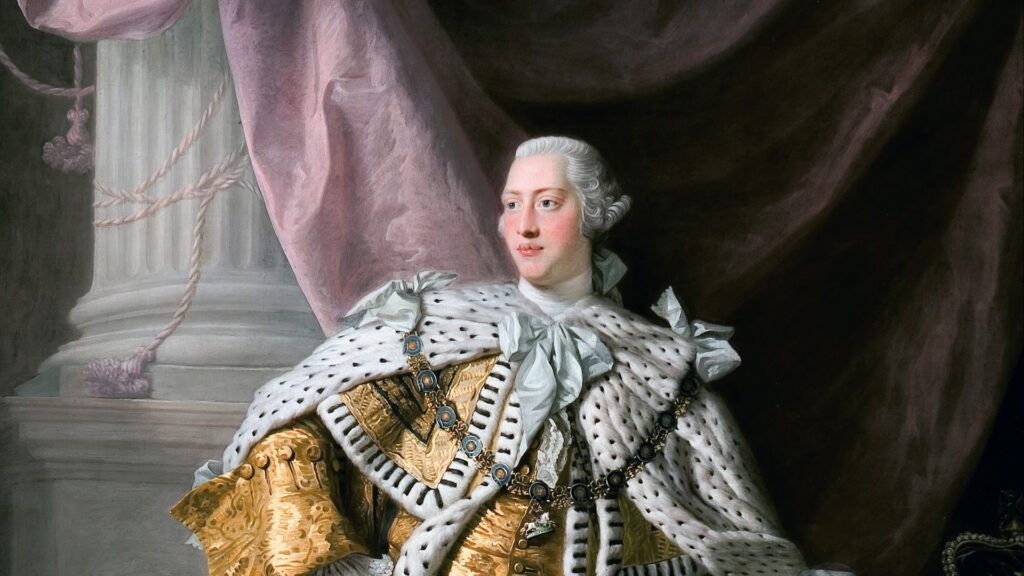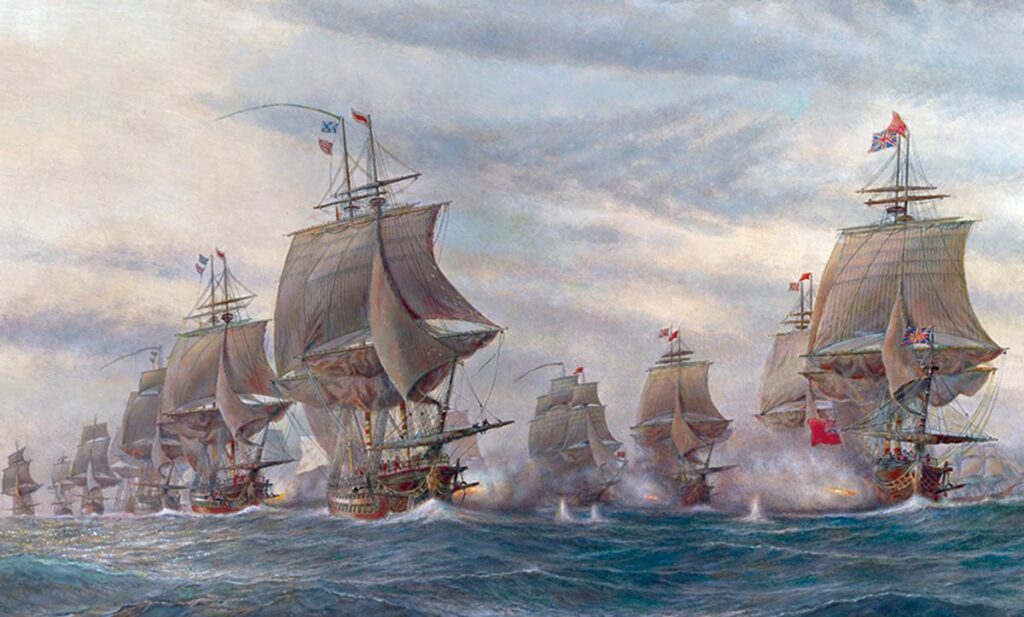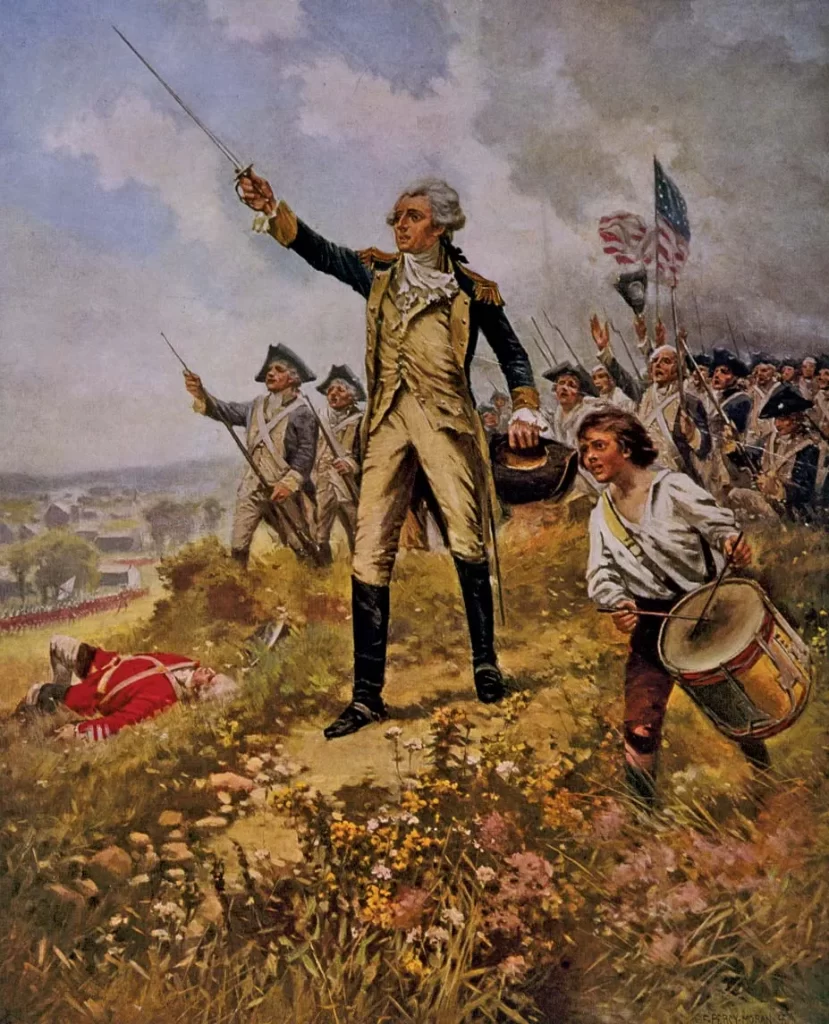The decade or so that occurred before the next stage of the Anglo-French struggle gave only a few hints of the sharp turnaround that was to come in British fortunes (Hint: They were about to lose their Thirteen Colonies in North America).
Despite being the undeniable winner of the bloody Seven Years’ War, soon they were to get a taste of what the French might call ‘some of their own medicine’.
The years of peace after the war would cause Britain to grow lax in their military spending, and arrogant in their diplomacy with their fellow European nations.
As a result, when the American Revolutionary War started, Britain would not only find itself unready for a war, but it would also find itself friendless and without allies.
Domestic Issues Take the Fore
The last war had shocked all the Great Powers and had left their finances crippled, and so most frowned upon a bold foreign policy.
Instead, this was a time during which introspection and reform were the order of the day.
The cost of the war – half a million dead – had not only horrified Prussia, it pushed the once-ambitious Frederick the Great to opt for a quieter life.
And in the Austrian Habsburg Empire, Maria Theresa’s ministers were also overhauling a governmental system that was badly in need of reform.
Perhaps the only country with a somewhat ‘bold’ foreign policy during this period was Russia who was aiming to expand south and also chip away at Poland’s sovereignty.
But this can still be considered a more local issue compared to the European combinations that led to the Seven Years’ War.
Nonetheless, even they would have to grapple with administrative reforms and suppress the threatening Pugachev Revolt (1773-5).

In Britain and France too, domestic affairs held greater attention than in previous decades.
The war had also damaged its financial standing despite its success, and so the British were looking for alternative sources of revenue during this period of peace.
This, in addition to the political infighting between the King and the Opposition only made them even more preoccupied to deal with foreign policy.
As a result, British diplomacy became more and more haphazard and clumsy than it had been before and during the war.
And it was this same ineffective diplomacy that increased the tensions with the American colonists over taxation and the enforcement of the Acts of Trade and Navigation.
France Readies Itself for War
In France, however, attention to domestic issues did not so completely eclipse foreign policy matters.
Still smarting from their defeat in the Seven Years’ War, French ministers began taking measures to strengthen the French position for the future.
Its navy was built up, and it renewed and deepened its alliance with Spain.
Additionally, they would continue their anti-British foreign policy and do all they could to weaken Britain’s position during this time and extract benefits from any problem Britain was facing overseas
Interestingly, this explains why France encouraged Spain to fight against Britain during its conflict over the Falkland Islands in 1770, and also why they would back the American revolutionaries during the upcoming American War of Independence (1775-1783).
Britain’s Weakening Position
All this meant that by the time London’s quarrel with the American settlers turned into open hostilities in 1775, Britain was in a far weaker position than it had been at the start of the previous war in 1756.
And this had much to do with the poor leadership in Britain.
Poor Leadership
None of the leading politicians of the day such as North or Shelburne could muster up an adequate grand strategy to deal with the conflict.
Moreover, political factionalism, George III’s meddling, and the fierce debate over the settlers’ case divided Parliament and the nation.
Even worse for Britain was that the two main pillars of British power, the navy and the economy, were steadily eroded during these years.
Weakening Economy and Navy
Exports, which had stagnated following the boom period of the Seven Years’ War, continued declining throughout the 1770s partly due to the boycott by the revolutionaries and also due to the growing conflict with the French, Spanish, and the Dutch.
The years of peace had led to the weakening of the once-powerful Royal Navy as funds were continuously diverted away from it.
Nor had its officers gotten much experience in war over these years and so were unseasoned like chicken freshly bought from the butcher’s shop.
Incompetent Decision-Making
And the Royal Navy’s position was only worsened by the incompetent decision to impose a maritime blockade on France in 1778, which effectively meant the surrendering of control of the seas.
Such a blockade would have involved positioning warships around the waters near France and its colonies in order to prevent ships from entering or leaving.

This is important because had they continued with this strategy which had worked so well during the Seven Years’ War and the prior War of the Spanish Succession, they would have prevented the French from sending supplies and assistance to the American revolutionaries.
However, by the time the Royal Navy’s dominance was reasserted in 1782, the American Revolutionary War was virtually over; it was too little too late.
Was the War Impossible to Win Anyway?
Yet, it seems that even if the nation had been better led during this war, and the navy had been better equipped, they would still have been hard-pressed to succeed due to there being two major strategical problems that did not exist in any other seventeenth-century war.
Logistical Issues
The first was that once the American rebellion had spread, the British would have to start a large-scale continental conflict that was 3,000 miles away from home.
In other words, maritime superiority was certainly not going to be enough, especially since the Americans were mostly self-sufficient and so were not particularly dependent on maritime trade.
That being said, it certainly did reduce weapon imports which were needed to fight.
In any case, reconquering its rebelling American colonies would have been a tough ask even for Napoleon’s Grande Armée let alone the British-led troops of the 1770s.
Communication, you see, is paramount in any war, yet the delays in any news coming to London or even to New York only exacerbated the logistical problem and hampered them strategically.
And whilst the war ministry had made improvements, the burden to procure and ship necessary men and materials for the war was simply too much.
Moreover, unlike in Europe, American settlements were so decentralized that holding a city or town meant little, so unless they could hold the surrounding territory as well, they would not be able to get too far.
If it took 50,000 British troops along with American settler support to conquer French Canada twenty years prior, re-imposing British control would then need something like 150,000 – 250,000 men to complete the job.
As a result, the conflict was simply improbable to be won using military means alone.
Friendless & Diplomatically Isolated
And the second problem was this: unlike in other wars during this century, Britain fought this war alone, without any partners to distract the meddlesome French.
This was, in large part a diplomatic problem rather than a military one.
The British were now paying for breaking their alliance with Prussia after the end of the Seven Years’ War, their arrogance towards Spain, and their heavy-handed dealing with neutrals like Denmark and the Netherlands, along with their failure to secure Russian support.
Not only did it find itself increasingly friendless in Europe, Britain also had to contend with the League of Armed Neutrality which was set up to protect neutral nations from the Royal Navy which was searching all ships for French contraband destined to help the American revolutionaries.
The League included the likes of Russia, Prussia, Portugal, Austria, and the Ottomans – which only illustrated their diplomatic isolation.
Eastern Europe Detaches Itself
But this is not only a story of diplomatic ineptitude on the part of the British.
Eastern Europe was by now becoming more and more detached from Western European states such as France and Britain who they were previously tied to for aid and subsidies.
But now they had the independence to concentrate on other issues such as the partition of Poland, the Bavarian succession, and relations with the Ottomans.
Before, there was a desire in France to become the ‘arbiter of Europe’ and so the French would have made sure to create alliances against Britain with the eastern monarchies to achieve this goal, but recently the French had declined in importance as a result of the Seven Years’ War.
And due to this, London didn’t need to involve itself in creating a counter-alliance with other eastern nations, thus helping exacerbate this detachment between the East and West.
Perhaps during this period, Russia under Catharine II was most sympathetic to the French desire to overcome the British, but they always going to be unlikely to join unless the prospects of destroying the British were good enough.
And that also brings us to the final reason for Britain’s diplomatic isolation.
France’s Winning Strategy
And that is that France during this conflict had resisted the temptation to bully the Netherlands as they had done multiple times before, and also attacked Britain through Hanover (Britain and Hanover shared the same monarch) as they did during the Seven Years’ War.
Instead, they chose to concentrate their resources on fighting Britain on the seas, which meant, for the first time ever, France was to concentrate on fighting a maritime and colonial war.
The results of this choice on the part of the French were quite remarkable as it forced the British to rethink their strategy that had worked so well against France over the past century.
Up until then they would fight the French on the sea, and bring other nations into the war who feared a French aggression to fight on their side.
But since now the French were not invading anyone on land, Britain lost one-half of its two-pronged strategy, whilst France no longer needed to split its resources between its army and navy.

Indeed, during the Seven Years’ War, the French Navy was allocated only 30 million livres a year, just one-quarter of the army’s allocation, and only one-fifth of what the Royal Navy was receiving.
Over the years, the French navy budget steadily rose, and by 1782 it had reached 200 million livres.
So by the time the French entered the American Revolutionary War, it had 52 ships of the line, with many being larger than their British equivalents, and soon it increased to 66.
This was in addition to Spain’s 58, and later in 1780 the Dutch joined the war on their side and added an extra 20.
Now, while the Royal Navy was greater in size than any one maritime rival, when combined, it no longer had the advantage of numbers (by 1779, it only had 90).
In fact, by 1779, a Franco-Spanish invasion of Britain was starting to look increasingly likely, and it was actually France’s numerical superiority in the waters off the Chesapeake which prevented the Royal Navy from intervening.
And when help failed to come, Cornwallis was forced to surrender during the Siege of Yorktown, a surrender which effectively spelled Britain’s defeat.
It was really starting to seem as though British naval power was regional and temporary and not, as in previous campaigns, overwhelming.
The War Comes to an End
For France though, by 1782 it was soon becoming evident that the upkeep of such a large navy was putting a strain on their economy.
Naval stores were becoming harder to acquire and the shortage of sailors was becoming critical.
This was coupled with the concern on the part of the French ministers that France was diverting too many resources away from the continent, and so was reducing their relevance there.
Meanwhile, France’s allies, Spain and the Netherlands were also starting to feel the pinch, and this only made them hope for a quick end to the war.
Nevertheless, Britain’s better financial stamina resulting from the export boom after 1782 and the improvements in the Royal Navy still could not salvage victory from defeat, nor could it convince the factions at home that victory was possible.
As a result, the war ended with the signing of the Treaties of Versailles (1783).
Although the Franco-Spanish alliance made some gains (Minorca, Florida, Tobago), it was still small compared to the huge imperial gains Britain made at the end of the Seven Years’ War.
Yet, France found itself well satisfied with Britain’s loss of the Thirteen Colonies and the creation of the United States.
That single loss dealt a huge blow to Britain’s position as a world power, and in Paris’s view, it had sensibly restored the balance of power which had been upset at the end of the Seven Years’ War.
Meanwhile in Eastern Europe…
In Eastern Europe on the other hand, the balance of power had not greatly changed by the maneuverings of the three monarchies (Austria, Prussia, and Russia) in the decades after the end of the Seven Years’ War in 1762.
The main reason for this was due to the triangular relationship of the three; neither Berlin, Vienna, nor St Petersburg wanted the other two to form an alliance against them in the same way it happened in the Seven Years’ War.
This was highlighted when Prussia’s opposition to Austria’s expansion led to the very brief and cautious War of the Bavarian Succession (1778-9) which displayed their mutual desire for the conflict not to become a wider Great Power struggle.
Ergo, any future acquisitions of territory would have to occur diplomatically at the expense of weaker powers, as happened when on three separate occasions the three carved up Poland’s territory between themselves.
Yet, despite the diplomatic and geographic confines of this triangular relationship, it was actually Russia’s position that improved relative to that of Austria and Prussia.
Despite its backwardness, it was less vulnerable than the other two, which made both Prussia and Austria more wary of the Russians than they were of each other.
This fact was why the largest portion of the unfortunate state that was Poland fell into Russian hands during its partition.
Apart from that, Russia also made great strides against the Ottomans, annexing Crimea in 1783, and making fresh gains along the Baltic in 1792.
This not only confirmed the decline of the Ottomans, but it also continued to worry the other two, along with Sweden and Britain.
But with both Berlin and Vienna eager to placate the formidable Russians, and with the distraction of the Western nations with the American War of Independence, Czarist Russia’s growth continued unimpeded.
Footnotes & Further Reading
Kennedy, Paul M. The Rise and Fall of the Great Powers: Economic Change and Military Conflict from 1500-2000. London: William Collins, 2017.


